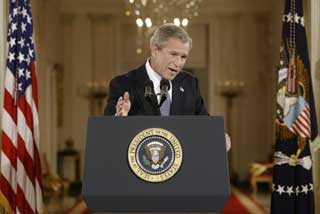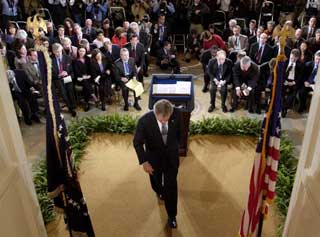|
Bush faces press with no regrets
(Agencies)
Updated: 2004-04-15 00:44
US President George W. Bush, speaking to the American public at a rare prime-time news conference,had no apologies to make, although some said he appeared almost apologetic at times.

President Bush answers the first question during the start of a nationally televised news conference at the White House April 13, 2004. [Reuters] |
Despite the failures highlighted in the government's pre-September 11 intelligence operations, despite the futile search to find weapons of mass destruction in Iraq and all the recent violence there, Bush came up empty on Tuesday when asked -- repeatedly -- if he'd made mistakes.
"I'm sure something will pop into my head here," he said in just the third evening press conference of his presidency. "I don't want to sound like I have made no mistakes. I'm confident I have."
But "maybe I'm not as quick on my feet as I should be in coming up with one."
He hemmed. He hawed. He allowed that "hindsight's easy" and -- armed with that rearview mirror -- he would have liked to have had a Homeland Security Department and a Patriot Act before the terrorists struck.
"We weren't on a war footing," he said, "and yet the enemy was at war with us."
He acknowledged he has asked himself repeatedly whether his administration could have done anything to stop the September 11, 2001 attacks. He did not directly answer his own question, saying only that if he'd had an inkling about what was to happen, he would have done anything to head it off.
He said the Iraq War was justified, for America's sake and for the Iraqi people's.
"Of course, I want to know why we haven't found a weapon yet," he said. "But I still know Saddam Hussein was a threat. And the world is better off without Saddam Hussein."
On the protracted struggle against insurgents trying to drive American forces out, Bush said liberty doesn't come easily, and invoked the American Revolution: "I mean, we had a little trouble in our own country achieving freedom."
He was not about to second-guess his decisions, but rather to leave that job to historians.
"I would've gone into Afghanistan the way we went into Afghanistan. Even knowing what I know today about the stockpiles of weapons, I still would've called upon the world to deal with Saddam Hussein."
And there was to be no apology for what the government did or did not do in the months before the terrorist attacks, when the air was thick with signs of trouble that his administration says were too vague to act upon.
"Here's what I feel about that," he said. "The person responsible for the attacks was Osama bin Laden. That's who's responsible for killing Americans. And that's why we will stay on the offense until we bring people to justice."
More troops headed overseas
Giving no ground despite rising casualties, Bush says more American troops may be heading for Iraq with authority to use decisive force in a mission that "may become more difficult before it is finished."

U.S. President George W. Bush walks away from the East Room of the White House following a nationally televised news conference April 13, 2004. Bush said on Tuesday the June 30 deadline for the transfer of Iraqi sovereignty was a central commitment of the U.S. mission in the country. [Reuters] |
Bush said the US will is being tested by violence that has turned April into the deadliest month in Iraq since the fall of Baghdad a year ago.
"Look, nobody likes to see dead people on their television screens," Bush said. "I don't. It's a tough time for the American people to see that. It's gut-wrenching."
A recent spike in violence has killed at least 83 US troops this month as US forces are fighting Sunni Muslim insurgents in the city of Falluja, Shi'ite militiamen in the south and gunmen in Baghdad and on its outskirts.
In response, Bush said he has told military commanders to be prepared to use "decisive force" against insurgents and that he was ready himself to allow an increase, rather than the planned decrease, in US troops in Iraq.
He promised "evidence in the months to come" of progress in Iraq,both for Iraqis and Americans growing weary of the instability and violence plaguing the country. But he also warned that success could come at an even higher cost than already is being paid.
"Our work may become more difficult before it is finished," the president said. "No one can predict all the hazards that lie ahead or the cost that they will bring. Yet, in this conflict, there is no safe alternative to resolute action."
Predicts election win
The speech and question-and-answer session focused on Iraq and the government's reaction to warning signs about terrorists before the attacks of September 11, 2001.
Neither Bush's 17 minutes of opening remarks nor the 15 questions that followed strayed from those two topics, which the president has made central to his re-election but on which his support in polls has declined markedly.
Nonetheless, the president expressed confidence he would win over voters in elections this November.
"I don't plan on losing my job. I plan on telling the American people that I've got a plan to win the war on terror. And I believe they'll stay with me," he said.
Touts NATO help
Looking longer-term, he tried to answer critics who have said the Iraq operation is too dominated by the United States. He touted efforts to devise a more formal role for NATO and to win the involvement of additional countries by giving a UN envoy the power to help decide which Iraqis would be placed in charge when power is transferred on June 30 from the US occupying authority.
Bush also said he was "proud" of the coalition of countries that had sent troops to Iraq and suggested he would seek a new UN Security Council resolution "that will help other nations to decide to participate" in Iraq's reconstruction. He did not elaborate.
The president said that within the last week he had spoken to Italian Prime Minister Silvio Berlusconi and Polish President Aleksander Kwasniewski, both of whom have sent troops to Iraq, saying he was "heartened" by their resolve.
British Prime Minister "Tony Blair is the same way," Bush said. "He understands, like I understand, that we cannot yield at this point in time, that we must remain steadfast and strong."
Bush repeated his resolve to see that the June 30 date is met, saying to do otherwise would lead Iraqis to feel betrayed and "those in Iraq who trade in hatred and conspiracy theories" to gain strength.
Declining public support
Senator John Kerry, the likely Democratic party candidate in the presidential election, said the president has failed to explain how he would stabilize Iraq.
"We need to set a new course in Iraq," the Massachusetts senator said in a statement. "We need to internationalize the effort and put an end to the American occupation. We need to open up the reconstruction of Iraq to other countries. We need a real transfer of political power to the UN."
Even as Bush outlined what he portrayed as a detailed roadmap to success in Iraq, his appearance was every bit as much about trying to shift public opinion on the US mission.
According to polls, approval of his handling of Iraq among Americans has declined to the mid-40 per cent level, and approval for his handling of terrorism has dipped into the mid-50s. Growing numbers of people say the military action in Iraq has increased rather than decreased the threat of terrorism.
Perhaps most surprising was Bush's switch from a consistently upbeat view of the situation in Iraq to what he acknowledged was a "pretty somber assessment" on Tuesday of the difficulties there. He talked of "tough weeks" and "serious violence," acknowledging that recent developments have been hard on the military and their relatives, on the American public and even on his own administration.
He also admitted, for the first time, that Iraqis are not entirely pleased with the situation created by the US-led war.
"They're not happy they're occupied. I wouldn't be happy if I were occupied either," Bush said.
But he would only go so far, rejecting comparisons to the Viet Nam War -- which have come mostly from Democrats critical of Bush's Iraq policies -- and insisting that most Iraqis are glad that the United States freed their country from Saddam Hussein's rule and are remaining there to help provide security.
|